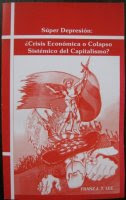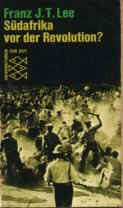Venezuela: Are we really losing the revolution?
By Franz J. T. Lee
The Twilight of the 'Wretched of the Earth'
Across the globe, over the last decade, the 'wretched of the earth' have set their hopeful, tearful, proletarian eyes on the Bolivarian Revolution in Latin America, in particular, on Venezuela, on President Hugo Chavez Frias, on the United Socialist Party of Venezuela (PSUV). What is happening here in Venezuela doubtlessly has global, transhistoric relevance. Internally and externally, from all over, sincere, solidaric comrades are confused about the character of the Bolivarian Revolution, are concerned about its immediate future, some voice their constructive and some their desperate critique of the current situation, and some are being misled by the ongoing international media war against the Venezuelan government. The following reflections are of a general, theoretical nature which will be followed by more detailed analysis later. The topic is delicate, hence it is imperative to place it in its emancipatory global context.
Surely, it is our historic responsibility to defend all the gains which the Bolivarian Revolution has brought to the impoverished workers. We need not categorize all these gains here; President Hugo Chavez Frias himself repeats them daily in all his national and international programs and interviews. Who wants to verify his statistics and facts should come to Venezuela to investigate the reality of the Bolivarian Revolution here and now.
However, we should recall that bourgeois capitalist history has demonstrated that one of the most complicated things to make is a global revolution. The current mode of production which today is annihilating itself systematically, was born in Miletus nearly three millennia ago: only now it is full grown, or using the words of Immanuel Kant, has transformed itself to full recognizability.
Who cannot see it now, will not have much time left to learn to see it in the near future. The capitalist revolution has been the formidable weapon of revolutionary capitalism. By careful study we would note, that not socialism but its negation, capitalism, is revolutionary.
Now, concerning the current political moment that the Bolivarian Revolution, its leader Hugo Chávez Frias and the United Socialist Party of Venezuela are experiencing, what is going on? What is going wrong? For now and to start with, we can only deal with the concept of revolution, by trying to place it under a macroscopic critique.
Why is it only now, that many a concerned observer would suddenly note that something is going wrong with our Bolivarian Revolution? Why does it go unnoticed that something was going wrong with all the past and current revolutions undertaken in the name of the 'wretched of the earth'? In whose interest have revolutions really materialized? Who benefited or benefits, as the Latin question 'cui bono' asks? In whose class interest is it to 'radicalize' the Bolivarian Revolution and which class would rather be interested in getting rid of president Chavez and the PSUV? Then, whose interests is the PSUV defending? Why has there been an avalanche of warnings and calls for self-critique and rectification? Who really cares about socialism in Venezuela?
Well, most certainly I do care, many of us do!
Ever since three decades, I have been living, teaching and fighting for emancipation in this beautiful country among its warm and friendly working population! Over the last decade, I have been completely free to voice my political opinion, always trying to contribute in a scholarly, scientific and philosophic manner without attacking anybody ad hominem, because problems never boil down to the actions of a single individual but rather have to be placed in their historical context.
Now, let us ask some guiding questions.
In history, in the course of the class struggle, which of the revolutions succeeded to definitely defend and globalize itself after its political and military victory? Which revolution definitely materialized its class interests and attained its social, political, economic and cultural goals?
In the answer lies the very quintessence of a revolution and the very clue to detect whether anywhere in our world today a revolution is actually taking place, expressing itself in practice and ideology.
Taking as an example some authentic, great revolutions like the American, French and Industrial Revolutions, we should ask ourselves: What class interests did they have in common? In which way were these Revolutions connected? What was their respective historical tasks? In which point did they all converge? Who really celebrated these revolutions? Did the serfs, slaves, peasants and workers celebrate them? Why, after eons, has the dawn of the 'wretched of the earth' not set on as yet?
What then was and still is, the social function of a revolution? Venezuela, let us scrutinize the following:
* Revolution - 'rivoluzzione' or 'rivoltura' - was born in a specific, historical era to bring capitalism into power as the dominant mode of global destruction;
* Revolution had the historical task to destroy the feudal mode of production, its class structure, its theological superstructure and absolutist State;
* Revolution had the historical task to industrialize the metropolitan states and to convert the 'Third World' into a huge concentration camp of cheap labor and a paradise for the exploitation of natural resources.
* Revolution had the historical task to dialectically establish and reinforce 'unequal exchange' (Samir Amin), the two sides of the world market, the splitting of the world into capitalist and colonial countries. For example, as a producer of agricultural products and later as an oil-producing extractive economy, with no original accumulation of capital and no corresponding class structure, Venezuela got underdeveloped at the same rate as Europe or the United States were 'developing' themselves.
* The last country which would enter the realm of metropolitan industrial countries in the 20th century, was Japan. Till globalization, the rest of the 'United Nations' were not allowed to participate in the sonorous process of global revolution and revolutionary globalization.
* Hence, one thing is to make the bourgeois democratic capitalist revolution in the metropolitan countries and another thing is to be a victim state (what nowadays is cynically being called a 'failed society' or 'rogue state') ransacked by revolutionary globalization or global revolution. The latter is the case of contemporary Venezuela. Not any country of the world can make a revolution, not even one 'sui generis', competing against the 'Empire'. To have a minimum of possible success, we need to be very precise with our thoughts and acts.
*The revolution, as historically proven, is capitalist in nature. Capitalism has been the first and only, truly revolutionary mode of production in history, as stated by the very Karl Marx and Friedrich Engels in the Manifesto of the Communist Party. Now, concerning emancipation and its theoretical and political 'vehicle' so as to pull the emergency brake and put a stop to the exploitation of man by man, as well as the exploitation of nature by society - we need a new philosophy, much more powerful than all of bourgeois Illustration at its time, one that even 'transcends' dialectical materialism. We cannot fall back and try to make a revolution that's already been made and globalized and of which we have been the historical victims, ever since the onset of the transatlantic slave trade; much less can we continue to remain immersed in ideological confusion and religious, messianic illusions. Let us leave the incorporation into revolutionizing corporate capitalism to other possible candidates, who aspire to be the new partners in this imperialist 'Holy Alliance', like Russia, India, China, Brazil and who knows, South Africa. This is not, should not be, our endeavor.
What stands on the order of the day in Venezuela and the world is the emancipation of the wage slaves in the factories, in the oil industries, in agriculture, in the laboratories, in the offices, in the educational sector, in the armies, in the state apparatuses. In this field and with regard to the destruction of surplus value and the annihilation of private property of the major means of production, very little has been done. Nationalization is not socialism, much less emancipation, in reality, it is capitalist quid pro quo, business as usual.
Anti-capitalism, anti-imperialism, socialism must reflect itself in words and deeds, words alone don't suffice. We can find the finest jewels in the speeches of President Chavez, in the broadcasts of alternative community radios and TV's, even in the state-run media, and more so even in the political program of the PSUV itself. There we find all the emancipatory expectations, anticipations, heart-felt wishes and desires of the workers and peasants, of the exploited classes. However, if reality does not reflect any of these manifold, anti-capitalist expressions, apart from one or the other, barely perceptible tendency, our speeches, broadcasts and programs become ideology.
Do we perhaps have a problem with the '11th Thesis of Marx on Feuerbach'? Thus, are we just interpreting Venezuelan reality in various ways, but not changing the capitalist conditions, not really and concretely creating a better world for the millions of poor workers, as Bertolt Brecht so eloquently demanded?
Is this why many perceive and fear that the revolution is in danger, that we might lose the revolution? Is this the reason for the declining support by the grassroots base for the Bolivarian Revolution? Is this the reason why we once again will be seeing the faces of the past in the new Venezuelan parliament from next year on?
One thing's for sure, something is going wrong and has to be corrected urgently. To begin with, the glaring difference between the political program of the United Socialist Party of Venezuela and the reality on the ground, the ideological wedge of what politicians say or write and what they actually do, has to be eliminated. Only when this is done, only when the dialectics between praxis and theory has been established, can we hope to once again grasp the imagination, fantasy and unconditional enthusiasm of the Venezuelan workers, just like in the years 2002/2003 when for a brief time-span our emancipatory ideas transformed themselves into a material, liberatory force. The absence of theory and praxis and the nefarious presence of ideology and practice, where one thing is said and another thing is done, is the major reason why the Bolivarian ship of state is getting stuck in the Caribbean doldrums.
But rather than asking: Are we losing the revolution?, we should ask ourselves: are we gaining human emancipation? Are we on the way to transcend corporate, global capitalism, globalized revolution and revolutionary globalization? Are we on the way to eliminate exploitation of man by man and of nature by society, or are we in a Cancún-style game of bargaining and brokering and dealing with business as usual, nevermind the catastrophic consequences for humanity?
franz@franzlee.org.ve
By Franz J. T. Lee
The Twilight of the 'Wretched of the Earth'
Across the globe, over the last decade, the 'wretched of the earth' have set their hopeful, tearful, proletarian eyes on the Bolivarian Revolution in Latin America, in particular, on Venezuela, on President Hugo Chavez Frias, on the United Socialist Party of Venezuela (PSUV). What is happening here in Venezuela doubtlessly has global, transhistoric relevance. Internally and externally, from all over, sincere, solidaric comrades are confused about the character of the Bolivarian Revolution, are concerned about its immediate future, some voice their constructive and some their desperate critique of the current situation, and some are being misled by the ongoing international media war against the Venezuelan government. The following reflections are of a general, theoretical nature which will be followed by more detailed analysis later. The topic is delicate, hence it is imperative to place it in its emancipatory global context.
Surely, it is our historic responsibility to defend all the gains which the Bolivarian Revolution has brought to the impoverished workers. We need not categorize all these gains here; President Hugo Chavez Frias himself repeats them daily in all his national and international programs and interviews. Who wants to verify his statistics and facts should come to Venezuela to investigate the reality of the Bolivarian Revolution here and now.
However, we should recall that bourgeois capitalist history has demonstrated that one of the most complicated things to make is a global revolution. The current mode of production which today is annihilating itself systematically, was born in Miletus nearly three millennia ago: only now it is full grown, or using the words of Immanuel Kant, has transformed itself to full recognizability.
Who cannot see it now, will not have much time left to learn to see it in the near future. The capitalist revolution has been the formidable weapon of revolutionary capitalism. By careful study we would note, that not socialism but its negation, capitalism, is revolutionary.
Now, concerning the current political moment that the Bolivarian Revolution, its leader Hugo Chávez Frias and the United Socialist Party of Venezuela are experiencing, what is going on? What is going wrong? For now and to start with, we can only deal with the concept of revolution, by trying to place it under a macroscopic critique.
Why is it only now, that many a concerned observer would suddenly note that something is going wrong with our Bolivarian Revolution? Why does it go unnoticed that something was going wrong with all the past and current revolutions undertaken in the name of the 'wretched of the earth'? In whose interest have revolutions really materialized? Who benefited or benefits, as the Latin question 'cui bono' asks? In whose class interest is it to 'radicalize' the Bolivarian Revolution and which class would rather be interested in getting rid of president Chavez and the PSUV? Then, whose interests is the PSUV defending? Why has there been an avalanche of warnings and calls for self-critique and rectification? Who really cares about socialism in Venezuela?
Well, most certainly I do care, many of us do!
Ever since three decades, I have been living, teaching and fighting for emancipation in this beautiful country among its warm and friendly working population! Over the last decade, I have been completely free to voice my political opinion, always trying to contribute in a scholarly, scientific and philosophic manner without attacking anybody ad hominem, because problems never boil down to the actions of a single individual but rather have to be placed in their historical context.
Now, let us ask some guiding questions.
In history, in the course of the class struggle, which of the revolutions succeeded to definitely defend and globalize itself after its political and military victory? Which revolution definitely materialized its class interests and attained its social, political, economic and cultural goals?
In the answer lies the very quintessence of a revolution and the very clue to detect whether anywhere in our world today a revolution is actually taking place, expressing itself in practice and ideology.
Taking as an example some authentic, great revolutions like the American, French and Industrial Revolutions, we should ask ourselves: What class interests did they have in common? In which way were these Revolutions connected? What was their respective historical tasks? In which point did they all converge? Who really celebrated these revolutions? Did the serfs, slaves, peasants and workers celebrate them? Why, after eons, has the dawn of the 'wretched of the earth' not set on as yet?
What then was and still is, the social function of a revolution? Venezuela, let us scrutinize the following:
* Revolution - 'rivoluzzione' or 'rivoltura' - was born in a specific, historical era to bring capitalism into power as the dominant mode of global destruction;
* Revolution had the historical task to destroy the feudal mode of production, its class structure, its theological superstructure and absolutist State;
* Revolution had the historical task to industrialize the metropolitan states and to convert the 'Third World' into a huge concentration camp of cheap labor and a paradise for the exploitation of natural resources.
* Revolution had the historical task to dialectically establish and reinforce 'unequal exchange' (Samir Amin), the two sides of the world market, the splitting of the world into capitalist and colonial countries. For example, as a producer of agricultural products and later as an oil-producing extractive economy, with no original accumulation of capital and no corresponding class structure, Venezuela got underdeveloped at the same rate as Europe or the United States were 'developing' themselves.
* The last country which would enter the realm of metropolitan industrial countries in the 20th century, was Japan. Till globalization, the rest of the 'United Nations' were not allowed to participate in the sonorous process of global revolution and revolutionary globalization.
* Hence, one thing is to make the bourgeois democratic capitalist revolution in the metropolitan countries and another thing is to be a victim state (what nowadays is cynically being called a 'failed society' or 'rogue state') ransacked by revolutionary globalization or global revolution. The latter is the case of contemporary Venezuela. Not any country of the world can make a revolution, not even one 'sui generis', competing against the 'Empire'. To have a minimum of possible success, we need to be very precise with our thoughts and acts.
*The revolution, as historically proven, is capitalist in nature. Capitalism has been the first and only, truly revolutionary mode of production in history, as stated by the very Karl Marx and Friedrich Engels in the Manifesto of the Communist Party. Now, concerning emancipation and its theoretical and political 'vehicle' so as to pull the emergency brake and put a stop to the exploitation of man by man, as well as the exploitation of nature by society - we need a new philosophy, much more powerful than all of bourgeois Illustration at its time, one that even 'transcends' dialectical materialism. We cannot fall back and try to make a revolution that's already been made and globalized and of which we have been the historical victims, ever since the onset of the transatlantic slave trade; much less can we continue to remain immersed in ideological confusion and religious, messianic illusions. Let us leave the incorporation into revolutionizing corporate capitalism to other possible candidates, who aspire to be the new partners in this imperialist 'Holy Alliance', like Russia, India, China, Brazil and who knows, South Africa. This is not, should not be, our endeavor.
What stands on the order of the day in Venezuela and the world is the emancipation of the wage slaves in the factories, in the oil industries, in agriculture, in the laboratories, in the offices, in the educational sector, in the armies, in the state apparatuses. In this field and with regard to the destruction of surplus value and the annihilation of private property of the major means of production, very little has been done. Nationalization is not socialism, much less emancipation, in reality, it is capitalist quid pro quo, business as usual.
Anti-capitalism, anti-imperialism, socialism must reflect itself in words and deeds, words alone don't suffice. We can find the finest jewels in the speeches of President Chavez, in the broadcasts of alternative community radios and TV's, even in the state-run media, and more so even in the political program of the PSUV itself. There we find all the emancipatory expectations, anticipations, heart-felt wishes and desires of the workers and peasants, of the exploited classes. However, if reality does not reflect any of these manifold, anti-capitalist expressions, apart from one or the other, barely perceptible tendency, our speeches, broadcasts and programs become ideology.
Do we perhaps have a problem with the '11th Thesis of Marx on Feuerbach'? Thus, are we just interpreting Venezuelan reality in various ways, but not changing the capitalist conditions, not really and concretely creating a better world for the millions of poor workers, as Bertolt Brecht so eloquently demanded?
Is this why many perceive and fear that the revolution is in danger, that we might lose the revolution? Is this the reason for the declining support by the grassroots base for the Bolivarian Revolution? Is this the reason why we once again will be seeing the faces of the past in the new Venezuelan parliament from next year on?
One thing's for sure, something is going wrong and has to be corrected urgently. To begin with, the glaring difference between the political program of the United Socialist Party of Venezuela and the reality on the ground, the ideological wedge of what politicians say or write and what they actually do, has to be eliminated. Only when this is done, only when the dialectics between praxis and theory has been established, can we hope to once again grasp the imagination, fantasy and unconditional enthusiasm of the Venezuelan workers, just like in the years 2002/2003 when for a brief time-span our emancipatory ideas transformed themselves into a material, liberatory force. The absence of theory and praxis and the nefarious presence of ideology and practice, where one thing is said and another thing is done, is the major reason why the Bolivarian ship of state is getting stuck in the Caribbean doldrums.
But rather than asking: Are we losing the revolution?, we should ask ourselves: are we gaining human emancipation? Are we on the way to transcend corporate, global capitalism, globalized revolution and revolutionary globalization? Are we on the way to eliminate exploitation of man by man and of nature by society, or are we in a Cancún-style game of bargaining and brokering and dealing with business as usual, nevermind the catastrophic consequences for humanity?
franz@franzlee.org.ve













No comments:
Post a Comment